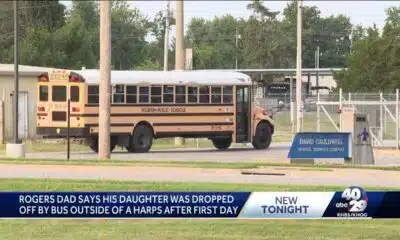News from the South - Alabama News Feed
California v Colorado: How two states leading AI legislation are approaching it differently
by Paige Gross, Alabama Reflector
May 18, 2025
Colorado was first in the nation to pass comprehensive AI regulation, in 2024, but less than a year before the law goes into effect, lawmakers find themselves trying to clean up the landmark legislation, with the hopes of refining some of the terms that Colorado businesses say could slow growth and stifle innovation.
“It signals leadership in a proactive stance on AI, risks and the benefits as well,” said Ryan Thompson, a tech and telecom lawyer at Hogan Lovells. “But on the con side, when you have a law that is broadly written, it could very well end up being overly broad and difficult to implement.”
The law is one example of how state legislators across the country have attempted to ensure privacy, fairness and consumer protection while leaving room for tech companies to grow these technologies on a global scale.
They’re doing so because the federal government has not yet regulated AI. Yet there’s been a big shift toward bipartisan support to enact some regulations in the last year, said Jeff Le, founder and managing principal of tech policy consultancy 100 Mile Strategies LLC.
“The polling is very clear that people are really worried about artificial intelligence,” Le said.
At least 550 AI bills have been introduced across 45 states and Puerto Rico in 2025, the National Conference of State Legislatures reported. And as legislative bodies study the technology to develop their own laws, many are looking to California and Colorado for inspiration.
The states have made history in the ways they’ve legislated AI with two different approaches. While California initially led the way on state-level AI regulation with multiple bills that increase business accountability, combat discrimination and regulate how businesses use data, Colorado became the first U.S. state to enact comprehensive AI legislation last year.
There are pros and cons to each approach, Thompson said. There’s an advantage to having a cohesive framework, nomenclature and set of obligations for everyone, he said. But narrower laws may create more clarity on specific aspects of the industry.
Colorado’s law, set to go into effect in February, could be a lesson to the rest of the country how to proceed.
Colorado’s Law
As it stands, Colorado’s law — called Consumer Protections for Artificial Intelligence — is the most comprehensive law regulating artificial intelligence in the nation. Other states, like California, Virginia and Connecticut have come close with similar bills in the last few years, but lawmakers or governors ultimately blocked them.
When Gov. Jared Polis signed it into law last year, he said that some parts of the law may need to be amended for more specificity.
Sen. Majority Leader Robert Rodriguez said in a statement to States Newsroom that his committee worked this year with industry and civil groups to develop SB 318, a bill meant to clean up the specific applications and descriptions about AI after hearing concerns from the state’s businesses community.
But the legislative session ended May 7 without a resolution, and the law will go into effect as written in February. It makes developers of AI responsible for consumer protections around “high risk” AI systems.
The law requires developers to disclose certain information about AI systems to those who will deploy it, and outline the potential risks of algorithmic discrimination — the potentially discriminatory outcomes that could come from decision-making algorithms, many of which are currently being used to sort and rank job applications, mortgages and health information, among other tasks.
“There’s not necessarily the frustration that this law exists, but rather frustration with some of its provisions,” said Arsen Kourinian, a partner at Mayer Brown who specializes in data privacy and AI law. “Some are vague and it’s difficult to apply them to actual use cases.”
For example, he said, the law includes certain carve-outs for “narrow procedural tasks” completed with AI, but the law does not define that term.
Rodriguez said he plans to continue conversations about amending the law through the summer — “It remains my goal to ensure we have a policy on the books that protects consumers without stifling innovation,” he said.
The balance of protections and innovation Rodriguez describes is the current crux of most AI legislation in the states. While most laws seek to put some sort of protections or guidelines in place to safeguard users against harm, many in the tech industry say they can’t be global competitors or grow the tech industry with protections like these in place.
“There’s a legitimate concern about, hey, if you over regulate the technology, then other countries are going to get ahead of us, and we’re going to be left behind,” Kourinian said. “So I think that’s the one concern with taking a Colorado approach, that there’s the perception that it might be over-regulation.”
California’s approach
That pressure to preserve the tech industry is what ultimately caused California Gov. Gavin Newsom to veto a similar, wide sweeping bill last year.
Senate Bill 1047 would have required safety testing of costly AI models to determine whether they would likely lead to mass death, endanger public infrastructure or enable severe cyberattacks. It made it through both chambers before Newsom said it could be “curtailing the very innovation that fuels advancement in favor of the public good.”
The state is in an interesting position because it’s home to an overwhelming majority of the country’s tech companies, said Teri Olle, Director of Economic Security California, an economic security advocacy group. Olle worked with lawmakers to develop SB 1047.
“You cannot walk down the street with your arms out without hitting somebody who’s … involved in AI, and maybe a billionaire,” Olle said. “We are in it.”
But a large majority of Californians supported the bill, including 64% of voters who work in the tech industry. It seemed that people were hungry for some kind of regulations, Olle said, but the fear of stifling innovation was stronger.
Olle said the feeling was that decisionmakers were keen for AI regulations, but there’s a “not here, not now” attitude.
“California is interestingly left in the limbo where they don’t have a comprehensive AI law,” Kourinian said. “And instead is addressing it on a piecemeal basis or through various other laws that apply in different contexts.”
Since SB 1047 was vetoed, more targeted AI bills have been having success this year in Sacramento. Assemblymember Rebecca Bauer-Kahan, a Bay Area Democrat, is the sponsor of two AI-related bills that advanced out of the State Assembly this month, one which regulates children’ s use of AI chatbots, and another called the Automated Decisions Safety Act that closely mirrors Colorado’s and other states approach in regulating decision-making algorithms. Bauer-Kahan has reintroduced the latter bill twice now, but it’s getting more traction this year
She said this incremental approach is just how California does things — “We tend to take more step-by-step approaches to legislation,” Bauer-Kahan said. In going too broad, you may risk watering down the focus of a law, she said.
The assemblymember, whose background is in regulatory law, said she would favor a federal approach to AI regulation.
“The problem is we don’t have a Congress that is going to do what our communities want, and so in the absence of their action, the states are stepping up,” she said.
Though the tech industry is such a huge part of California’s economy, Bauer-Kahan said she believes good regulation will not stop it from thriving, and in fact build more trust between companies and their users.
Moving forward
As many states close their legislative sessions in the coming weeks, those that have advanced AI laws, either in sweeping attempts like Colorado’s, or in a piece-by-piece approach like California, will likely continue to learn from other state’s approaches.
Even in tech-savvy California, Le said, legislators are not experts on the tech industry or its applications — “it does require serious inspection,” he said. And legislators will always struggle to keep up with the quickly changing norms of the tech industry.
Federal guidelines would simplify this process for every state, Le said, but it’s not clear how or when congress would seriously consider them, especially under a very pro-innovation, low regulation Trump administration. It’s likely that state legislative bodies will continue to explore what works best for them, and continue learning from states that pass influential laws in the meantime.
“I think the California context is generally not a question of if they’re going to do it,” Le said. “It’s how they’re going to do it.”
Alabama Reflector is part of States Newsroom, a nonprofit news network supported by grants and a coalition of donors as a 501c(3) public charity. Alabama Reflector maintains editorial independence. Contact Editor Brian Lyman for questions: info@alabamareflector.com.
The post California v Colorado: How two states leading AI legislation are approaching it differently appeared first on alabamareflector.com
Note: The following A.I. based commentary is not part of the original article, reproduced above, but is offered in the hopes that it will promote greater media literacy and critical thinking, by making any potential bias more visible to the reader –Staff Editor.
Political Bias Rating: Centrist
The content provides a balanced comparison between Colorado’s and California’s approaches to AI regulation, without overtly advocating for either state’s method. It presents both the advantages and challenges of each approach and includes quotes from industry experts and policymakers across the political spectrum, such as those from both states’ leadership. The article avoids ideological slant and highlights a general bipartisan push toward AI regulation. There is no clear ideological bias in the reporting, as it focuses on presenting factual details and differing perspectives without favoring one political ideology over another.
News from the South - Alabama News Feed
FBI raids Maryland home of Trump critic John Bolton
by Ariana Figueroa, Alabama Reflector
August 22, 2025
WASHINGTON — FBI agents raided the home and office of former Ambassador to the United Nations John Bolton, a one-time adviser to President Donald Trump who has become a frequent critic of the president, to investigate Bolton’s handling of classified documents, according to multiple media reports.
The raid on a former Trump adviser’s house represents an escalation from the Justice Department in targeting critics of Trump, whom he vowed to go after should he return to the White House for a second term.
Speaking to reporters Friday, Trump said he was not briefed on the raid of Bolton’s house in the wealthy suburb of Bethesda, Maryland, and office in Washington, D.C., according to White House pool reports.
But the president noted his longstanding feud with his former adviser.
“I’m not a fan of John Bolton,” Trump said. “He’s a real sort of a low life. He could be a very unpatriotic guy. We’re going to find out.”
Earlier this year, the president revoked the security detail for Bolton, who served as Trump’s national security advisor from 2018 to 2019 and as U.S. ambassador to the United Nations during the George W. Bush administration in 2005 and 2006.
Following his time in the Trump administration, Bolton, who was an important member of the Bush administration’s national security team that favored active military involvement in the Middle East, emerged as a chief Republican foreign policy critic of Trump, authoring a 2020 book that blasted the president and widened the public rift between the two men.
Bolton has not been charged with a crime and is not in custody, according to The Associated Press, which cited a person familiar with the matter.
The first Trump administration launched an investigation into Bolton to probe if he improperly used sensitive information in his book. The current search involves federal officials investigating Bolton’s actions over the last four years, according to the New York Times, which cited a federal law enforcement official.
Trump documents case
Trump himself was prosecuted for mishandling classified documents after the FBI raided his Florida golf course and main residence of Mar-a-Lago in 2022. A federal judge dismissed the resulting criminal charges against Trump.
FBI Director Kash Patel wrote on social media that “NO ONE is above the law,” and that FBI agents were “on mission.”
The FBI declined to comment.
In 2020, the Department of Justice opened a criminal investigation into Bolton’s book and tried to block its publication, but were stymied in court.
Patel also wrote a 2023 book where he lists Bolton, along with a dozen other people, as members of the “deep state” who are working against Trump, according to the Times.
Alabama Reflector is part of States Newsroom, a nonprofit news network supported by grants and a coalition of donors as a 501c(3) public charity. Alabama Reflector maintains editorial independence. Contact Editor Brian Lyman for questions: info@alabamareflector.com.
The post FBI raids Maryland home of Trump critic John Bolton appeared first on alabamareflector.com
Note: The following A.I. based commentary is not part of the original article, reproduced above, but is offered in the hopes that it will promote greater media literacy and critical thinking, by making any potential bias more visible to the reader –Staff Editor.
Political Bias Rating: Center-Left
This content presents a factual and detailed account of the FBI raid on John Bolton, a former Trump adviser turned critic, and provides context about Bolton’s history with Trump and his actions post-administration. It highlights the conflict between Trump and Bolton, includes direct quotes from Trump that are critical of Bolton, and references investigations into classified documents related to both men. While it covers perspectives from both sides and notes legal outcomes such as dismissed charges, it subtly emphasizes alleged abuse of power and retaliation by the Justice Department against Trump’s critics. This leads to a center-left lean, aiming for critical scrutiny of Trump and his administration while avoiding overtly partisan language.
News from the South - Alabama News Feed
Grants to boost local emergency alert systems in question as public media agency closes
by Jennifer Shutt, Alabama Reflector
August 20, 2025
WASHINGTON — The Corporation for Public Broadcasting will no longer administer a grant program that has so far provided millions of dollars to local television and radio stations to upgrade the equipment they use to send out emergency alerts.
The change comes after Republican lawmakers voted last month to defund the corporation, following a request from President Donald Trump to zero out more than $1.1 billion in previously approved spending for the organization.
Congress originally formed the Next Generation Warning System grant program in fiscal 2022 and provided the Federal Emergency Management Agency about $40 million during its first year.
FEMA then gave that money to CPB to reimburse stations for infrastructure and other improvements meant to get emergency alerts sent through the Integrated Public Alert and Warning System to more Americans.
That appears on track to change in the months ahead.
FEMA officials wrote in a notice of funding opportunity for the current fiscal year that the grants will now go directly to state and tribal governments that can then award funding to public broadcasting stations that make improvements to their emergency alert systems.
Democrats and some Republicans have raised concerns that without funding from the Corporation for Public Broadcasting, local stations wouldn’t be able to raise enough funding to remain in operation, potentially leading to holes in the country’s emergency alert system.
‘Rescission consequences’ for local public media
CPB, which plans to cease operations later this year, announced this week that it would no longer be able to administer the grant funding Congress approved during fiscal 2023 and 2024. The corporation had yet to determine which applicants would receive the funding lawmakers provided for those two years.
“CPB has been fully invested in the NGWS program and its mission to protect the American public,” CPB President and CEO Patricia Harrison wrote in a statement. “This is one more example of rescission consequences impacting local public media stations and the communities they serve—in this case, weakening the capacity of local public media stations to support the safety and preparedness of their communities.”
That could potentially leave much of the $136 million in grant funding approved by Congress in limbo.
CPB wrote in a statement that “FEMA should assume responsibility for disbursing the funds as Congress intended, or most of the FY 2022 funding—and all funds from FY 2023 and FY 2024—will go undistributed.
“As a result, critical emergency alerting equipment will not be purchased, leaving communities, especially those in rural and disaster-prone areas, without the upgrades Congress intended.”
A FEMA official, speaking on background, couldn’t say definitively how the agency would handle funding for those three fiscal years.
The White House and Office of Management and Budget did not immediately respond to requests for comment from States Newsroom on Wednesday about the grant program.
Projects funded so far include:
- Mid-South Public Communications Foundation in Cordova, Tennessee, which received $1.657 million to “replace a transmitter and two emergency generators to ensure the rural agricultural communities in Tennessee, Mississippi, and eastern Arkansas receive timely emergency communications.”
- Blue Ridge PBS in Roanoke, Virginia, which received $1.122 million to “replace critical broadcast infrastructure that will strengthen their signal in the mountainous region to reach more rural communities with targeted emergency alerts.”
- Louisiana Public Broadcasting, which received nearly $2 million to “install transmitters and antennas for KLTL-TV in Lake Charles and KLTM-TV in Monroe and update alerting equipment to enable statewide delivery of alerts and warning messages.”
Congress votes to end public media funds
Kate Riley, president and CEO of America’s Public Television Stations, released a written statement this week calling CPB’s inability to administer the grant program for FEMA “yet another devastating result of the rescission of public media funding.”
She also called on FEMA “to establish a new process for delivering this funding to public broadcasters” and urged “Congress to restore essential direct funding to local stations throughout this country whose communities depend on them for lifesaving public safety services, proven educational resources and essential community connections.”
Trump sent Congress a rescissions request in early June, proposing lawmakers eliminate previously approved funding for the Corporation for Public Broadcasting and several foreign aid accounts.
The House voted mostly along party lines to approve the full $9.4 billion proposal later that month. GOP senators, except Maine’s Susan Collins and Alaska’s Lisa Murkowski, approved a similar bill in July after removing spending cuts to the President’s Emergency Plan for AIDS Relief, or PEPFAR. The House voted to clear the revised legislation a few days later, sending the bill to Trump for his signature.
Alabama Reflector is part of States Newsroom, a nonprofit news network supported by grants and a coalition of donors as a 501c(3) public charity. Alabama Reflector maintains editorial independence. Contact Editor Brian Lyman for questions: info@alabamareflector.com.
The post Grants to boost local emergency alert systems in question as public media agency closes appeared first on alabamareflector.com
Note: The following A.I. based commentary is not part of the original article, reproduced above, but is offered in the hopes that it will promote greater media literacy and critical thinking, by making any potential bias more visible to the reader –Staff Editor.
Political Bias Rating: Center-Left
This content presents a critical view of the Republican-led defunding of the Corporation for Public Broadcasting and highlights concerns from Democrats and some Republicans about the negative impact on local emergency alert systems. It emphasizes the consequences of budget cuts initiated by former President Trump and Republican lawmakers, portraying these actions as harmful to public safety and local media. The overall tone and framing suggest a center-left perspective that supports public broadcasting funding and is critical of conservative fiscal decisions affecting it.
News from the South - Alabama News Feed
U.S. agriculture secretary announces end to subsidies for solar panels on farmland
by Sam Stockard, Alabama Reflector
August 19, 2025
This story originally appeared on Tennessee Lookout.
U.S. Agriculture officials announced a new initiative Monday to stop subsidies for solar energy panels that take up farmland while supporting cuts in agriculture grants to Tennessee universities.
Agriculture Secretary Brooke Rollins introduced the initiative by the Trump administration after a Future Farmers of America breakfast at the State Fairgrounds in Lebanon where she said the federal government will make new grants to bolster Tennessee farming while targeting grants that don’t help farmers’ production.
Rollins criticized the Biden administration’s Inflation Reduction Act and “market distorting incentives” for solar panels, which she said are eliminating Tennessee farmland.
The secretary made the statements even though a study by the nonpartisan Tennessee Advisory Commission on Intergovernmental Relations found that solar facilities aren’t likely to be the “primary driver” of development on farmland for decades. The study also determined that land can be returned to farming once a solar facility goes out of use.
Earlier this year, the federal government made dramatic cuts to higher education grants, including eliminating more than $31 million in funding to the University of Tennessee Institute of Agriculture, which houses agricultural research and resources for Tennessee farmers and communities in 95 counties.
Rollins defended the reductions, saying “Those cuts were being made in programs that did not align with the president’s vision of putting farmers first.”
Deputy Secretary Stephen Vaden of Tennessee described the reduction as a “repurposing” and said changes were made in research funding based on whether a grant “helps a farmer in the field make more money.” Projects aimed at “clean energy” or based on “racial criteria” were eliminated, he said.
In addition to stopping solar panel development on farmland, Rollins announced that nearly $89 million will go toward 13 rural development projects in 28 Tennessee counties to “promote partnerships” and infrastructure investments for rural education. The department has distributed nearly $100 million this year to more than 10,000 farmers through the Emergency Commodity Assistance Program, according to Rollins.
Some farmers have said they expect prices to increase because of President Donald Trump’s tariffs, which are forcing them to pass on higher rates to customers. Rollins said Monday the administration has signed eight new trade agreements expected to boost the nation’s economy.
Tennessee Lookout is part of States Newsroom, a nonprofit news network supported by grants and a coalition of donors as a 501c(3) public charity. Tennessee Lookout maintains editorial independence. Contact Editor Holly McCall for questions: info@tennesseelookout.com.
Alabama Reflector is part of States Newsroom, a nonprofit news network supported by grants and a coalition of donors as a 501c(3) public charity. Alabama Reflector maintains editorial independence. Contact Editor Brian Lyman for questions: info@alabamareflector.com.
The post U.S. agriculture secretary announces end to subsidies for solar panels on farmland appeared first on alabamareflector.com
Note: The following A.I. based commentary is not part of the original article, reproduced above, but is offered in the hopes that it will promote greater media literacy and critical thinking, by making any potential bias more visible to the reader –Staff Editor.
Political Bias Rating: Center-Right
The content presents a generally favorable view of policies and officials associated with the Trump administration, emphasizing support for traditional farming interests and criticism of the Biden administration’s approach to solar energy subsidies and grant allocations. While it includes some factual context and opposing data, the framing and focus on defending cuts to higher education grants and promoting rural development align more closely with center-right perspectives that prioritize agricultural production and skepticism of certain clean energy initiatives.
-
News from the South - Texas News Feed5 days ago
New Texas laws go into effect as school year starts
-
News from the South - Florida News Feed5 days ago
Floridians lose tens of millions to romance scams
-
News from the South - Arkansas News Feed7 days ago
Rogers Public School bus drops student off at grocer store, father wants answers
-
News from the South - Kentucky News Feed6 days ago
AmeriCorps is under siege. What happens in the communities it serves?
-
News from the South - Florida News Feed6 days ago
Protesters go on strike in Israel demanding ceasefire and release of Gaza hostages
-
News from the South - Missouri News Feed6 days ago
Three months since St. Louis tornado: How long will cleanup take?
-
News from the South - Georgia News Feed7 days ago
What do goats and Northfolk Sothern have in common? | FOX 5 News
-
News from the South - West Virginia News Feed4 days ago
Religious exemption debate front and center amid new school year in WV












































